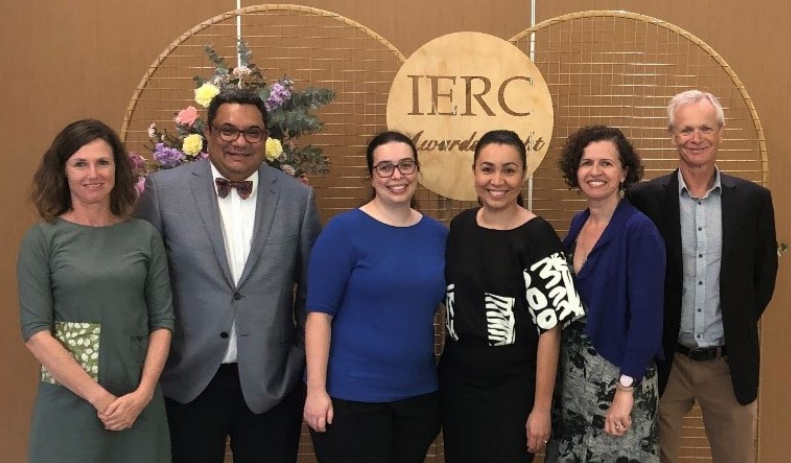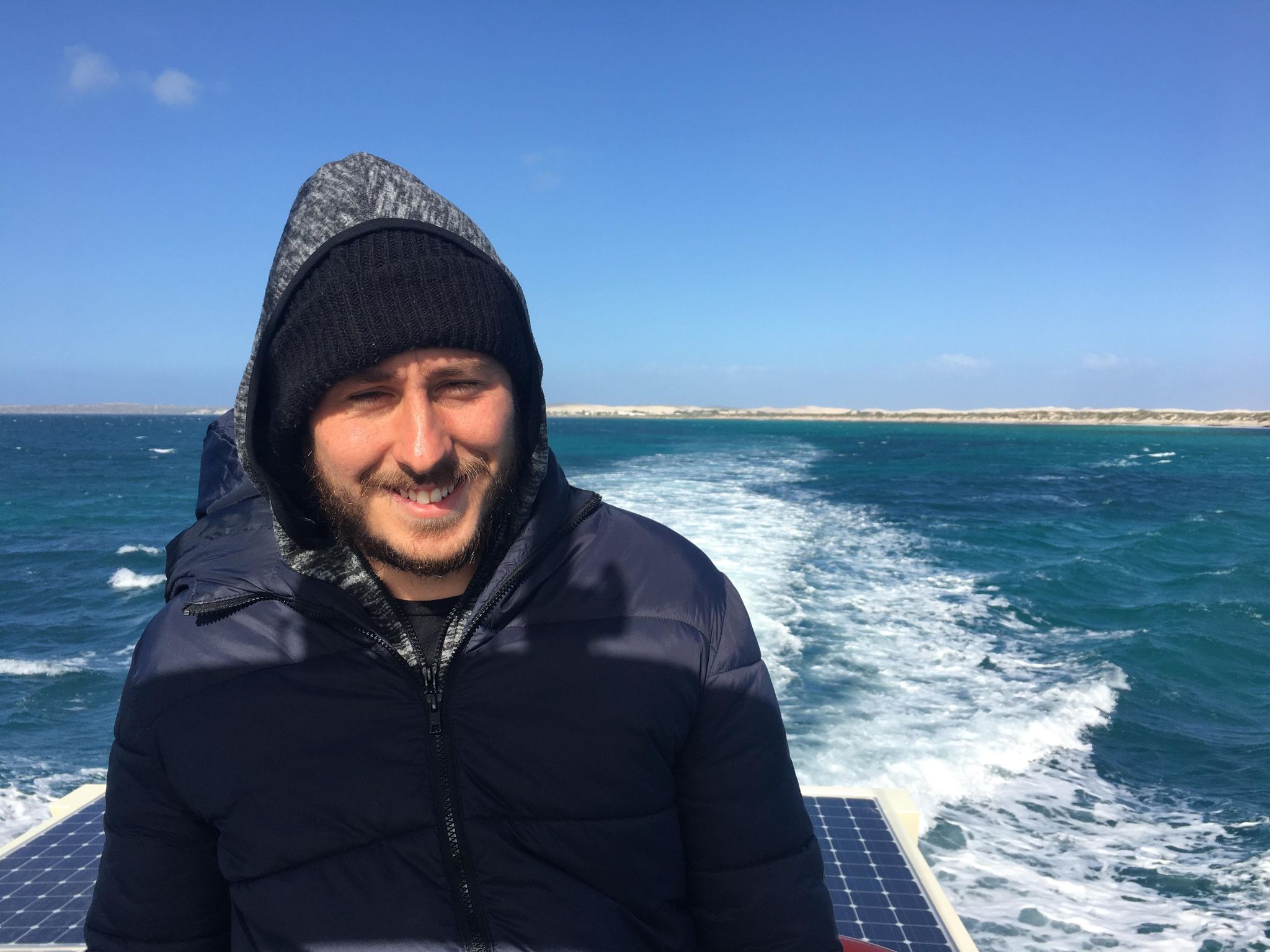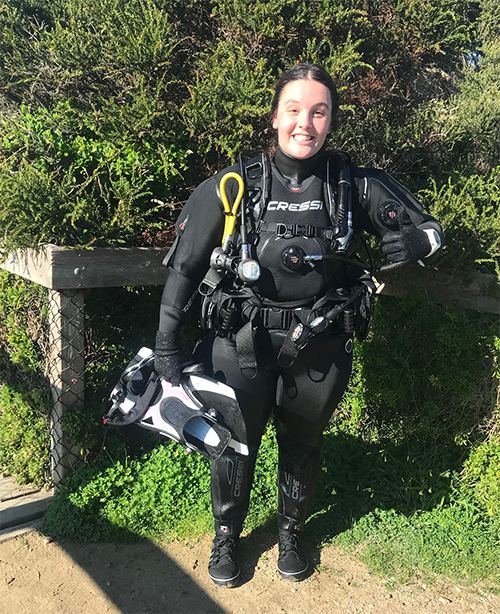Building Indigenous Research Capacity (BIRC)
Our Program Story
JCU and CSIRO have co-developed a student-centred initiative to build JCU Indigenous students research capacity and research career pathways (BIRC). The initiative began early in 2022 to learn about the important ways to connect with Indigenous students across JCU and identify a strategy to prioritise student needs in relation to future career goals, research, and alignment with CSIRO as a supportive and meaningful industry partner of JCU's. Students and researchers came together across Cairns and Townsville to discuss and collaborate on a range of initiatives which were developed into a model of engagement between place-based Indigenous communities, CSIRO, JCU and students. In 2023 we continue this important work and look to 2024 and beyond where we continue to translate these important relationships and industry partnerships into impactful research and community collaborations for Indigenous futures in Northern Australia.

JCU-CSIRO Strategic Relationship Operational Group members at the inaugural JCU Indigenous STEM awards.
Left to Right: Ally Lankester, Vincent Backhaus, Roslyn Hickson, Louisa Warren, Nerida Horner and Ian Watson.
Making Research Available
One of the projects of the initiative is making research experiences available for undergraduate second-and third-year students through paid and flexible research placements in CSIRO, JCU and other research institutions in the north. Students can get a taste of a research environment and build research skills, knowledge, and pathways before graduating.
For more information as a student
Contact Daan Felton-Bush with the JCU Indigenous Education and Research centre: daan.feltonbusch@jcu.edu.au
Or Fiona Smallwood with the CSIRO Indigenous Science and Engagement Program: Fiona.Smallwood@csiro.au
For researchers wanting to place a student
Contact Frank Gafa, University Partnerships Manager, CSIRO Indigenous Science and Engagement program
Frank.Gafa@csiro.au
Indigenous careers and student opportunities at CSIRO
CSIRO has opportunities across a wide range of roles – in human resources, administration, finance, communication, information technology, science and engineering – and offer excellent training programs and career development opportunities - Indigenous careers - CSIRO
Undergraduate students who are interested in a placement with CSIRO can contact Daan Felton-Bush at IERC or Fiona Smallwood at CSIRO to have a conversation and explore opportunities based on your interests.
CSIRO has an Indigenous Graduate Program that offers you more than just technical training in your discipline. Instead of recruiting for specific roles, CSIRO is looking for talent through an open campaign to attract diverse skills and experience right across our portfolio and Australia.
The program is intended to enhance your capability through a strong focus on professional development so you can become a future leader in your field.
There is an open opportunity to apply and register your career interests with CSIRO at any time.
For further information please contact Indigenous Graduate Program Coordinator, Tommy Zeaiter via Indigenouscareers@csiro.au
Alumni stories

Amarah Fiori feels passionate about Australian biodiversity conservation and that’s why she decided to study a Bachelor of Science, majoring in zoology and ecology.
An undergraduate student at James Cook University in Queensland, Amarah, who is of Kamilaroi descent, heard about CSIRO placements for Aboriginal and Torres Strait Islander students at a workshop at the JCU Indigenous Education and Research Centre (IERC) in Townsville.
Amarah was successfully appointed to an Agriculture and Food Vacation Studentship that was part of the AgCatalyst program, researching regulations for the aquaculture industry, and was supported by CSIRO to undertake the studentship from Townsville.
“I had the opportunity to step outside my comfort zone and do independent research to support the program, which is something I hadn’t done before,” said Amarah.
“Undertaking independent research, and learning scientific writing skills, really boosted my confidence, as did delivering a virtual presentation at the end of my studentship,” she said.
“I had great support from my CSIRO mentor Nick Wade as well as Ian Watson, Tansyn Noble and Simon Irvin.”
Amarah said that in addition to developing her writing and presentation skills, she learned about engaging with stakeholders and recognised that this would be a great help if she pursues a career in research. Just as importantly, a general boost in her confidence was one of her best takeaways from the program.
“I would definitely recommend this program to other Indigenous students. Lots of support is provided and the supervisors are super helpful. It was a good experience for me, both personally and academically,” said Amarah.
“The studentship is a good way to decide whether research is for you. Don’t write yourself off from a career in research!”
- In May 2021 a new JCU-CSIRO partnership was established, with representation from Indigenous Science and Engagement, Agriculture and Food, Environment, Health, and Biosecurity, and Science Impact and Policy Business Units. A key goal of the partnership has been to build Indigenous research capacity guided by a co-developed impact pathway and led by a JCU-CSIRO Indigenous working group consisting of Frank Gafa (CSIRO-IS&EP), Vincent Backhaus (JCU-IERC), Ally Lankester (CSIRO SI&P), Fiona Smallwood (CSIRO-IS&EP) and Daan Felton-Busch (JCU-IERC)
- Priority 1 of options co-designed at JCU-CSIRO workshops in May 2022 was “Making Research Available” and a pilot program began with four JCU Indigenous students seeking placement opportunities with CSIRO. The pilot has provided an opportunity to understand what is needed to build organisational/institutional capacity for creating successful placements for Aboriginal and Torres Strait Islander students.

Undertaking a research studentship at CSIRO has been a life-changing experience for Robyn Pearce.
A proud Barunggam woman, whose Country stretches around the red soils south and west of the Dividing Range in southern Queensland, Robyn has been studying at Bebegu Yumba campus, James Cook University (JCU). She says the skills she has learned during her studentship in CSIRO’s Health and Biosecurity division - and the confidence it has inspired - has resulted in her changing her career aspiration from research assistant to lead researcher.
It is fair to say that 54-year-old Robyn’s road to science was long and winding. She worked in administration and accounting for many years, which included working in family-run businesses in electrical and air conditioning as well as a quilting fabric shop.
The accidental student
Her motivation to head to university was to support her daughter, who had enrolled at James Cook University as an undergraduate student and was experiencing severe anxiety. Instead of just spending time on campus supporting her daughter, Robyn decided she should also enrol in a course.
It was 2018 and Robyn opted for a Diploma of Higher Education. It has been full steam ahead since then.
Following her Diploma, Robyn enrolled in a Bachelor of Science, majoring in zoology and ecology, before deciding to switch to molecular and cell biology because it was more analytical. After COVID hit, Robyn didn’t want to miss out on lab work, so she looked for another science-related degree to complement her original studies, enrolling in a Bachelor of Biomedical Science, majoring in microbiology and immunology.
In addition to studying, Robyn volunteers as an Indigenous Peer Assistance Learning Tutor and is a student ambassador for the JCU Indigenous Education and Research Centre (IERC). She had a couple of touch points to CSIRO. One was tutoring a CSIRO employee - who is also a student at JCU - and the other was winning the university’s IERC STEM award that was sponsored by CSIRO. That led to Ally Lankester and Fiona Smallwood from CSIRO telling Robyn about the CSIRO Vacation Studentship opportunity supported by the JCU-CSIRO Building Indigenous Research Capacity (BIRC) initiative.
For this wife, mother, grandmother and foster mother to a two-year-old boy, Robyn’s 12-week studentship continued after the vacation period, in parallel with her two degrees. Since the conclusion of her studentship, she has continued as a volunteer working on the joint JCU-CSIRO research project.
“I was given the opportunity to work on an avian influenza project, where we examined water samples for the virus,” said Robyn.
“It’s a pilot program that might lead to the detection of new viruses,” she said.
The work was conducted in Townsville, in conjunction with the Australian Institute of Tropical Health and Medicine.
Confidence boost
Robyn said the research skills she learned during her CSIRO studentship had resulted in a huge boost to her confidence.
“We’re very much handfed in our degrees, so it is great to do new and innovative things in the lab environment,” she said.
“I did a literature review, I designed a complete protocol, tested the protocol and started the project. I had always suffered from imposter syndrome and was worried that I wasn’t up to speed. Now my attitude is ‘I’ve got this’.
“It was valuable to contribute to a research project that is going to make a difference.
“For the rest of my life, I will appreciate the opportunity provided by CSIRO.”
Robyn said her primary CSIRO supervisor, Associate Professor Roslyn Hickson, had been a great support, as had Dr Anjana Karawita. Her JCU supervisor, Associate Professor Paul Horwood, had also facilitated her increased confidence by never micro-managing her.
“I started my degree thinking it would be great to become a research assistant, now my increased confidence has got me thinking that I would like to pursue postgrad study, including a PhD. I could even do postdoctoral work overseas. I really hope I inspire other Indigenous community members– particularly young people - to try something different,” said Robyn.
“The whole experience of the studentship was beneficial – working in an inclusive organisation like CSIRO, interacting with people who are passionate about their work and being accountable for your work.
“Australia also needs Indigenous-led research. That would be amazing.”
A love of learning
Supervisor, Assoc Prof Roslyn Hickson said Robyn exudes enthusiasm, optimism, a love of learning and the willingness and courage to try new things.
A/Prof Hickson said Robyn also has a strong foundation of logical reasoning and introduction to lab work from her undergraduate studies.
“This set of positive attitudes – combined with her foundational skills – meant she got the most from CSIRO’s 12-week research placement,” said A/Prof Hickson.
“I am excited to see where Robyn’s journey takes her. She is not only on an incredible scientific journey, but she is bringing many others along with her through a combination of her own inspirational story and her leadership.”
- In May 2021 a new JCU-CSIRO partnership was established, with representation from Indigenous Science and Engagement, Agriculture and Food, Environment, Health, and Biosecurity, and Science Impact and Policy Business Units. A key goal of the partnership has been to build Indigenous research capacity (BIRC), guided by a co-developed impact pathway and led by a JCU-CSIRO Indigenous working group consisting of Frank Gafa (CSIRO-IS&EP), Vincent Backhaus (JCU-IERC), Ally Lankester (CSIRO SI&P), Fiona Smallwood (CSIRO-IS&EP) and Daan Felton-Busch (JCU-IERC).
- Priority 1 of options co-designed at JCU-CSIRO workshops in May 2022 was “Making Research Available” and a pilot program began with four JCU Indigenous students seeking placement opportunities with CSIRO. The pilot has provided an opportunity to understand what is needed to build organisational/institutional capacity for creating successful placements for Aboriginal and Torres Strait Islander students.

It didn’t take Jake very long to work out that marine science wasn’t quite right for him. The Arrernte man from Mparntwe (Alice Springs) and James Cook University (JCU) student was more interested in numbers and logic. So, he transferred from a Bachelor of Marine Science to a Bachelor of Science with a maths major and physics minor.
Jake jumped at the opportunity to undertake a CSIRO Indigenous Undergraduate Traineeship. He worked on a project using wave modelling software to investigate reef conservation, which was a perfect fit as it tied together original and current study disciplines.
Jake's research project was investigating the effect of reef restoration on the attenuation (reduction of the force) of wave energy, and what that means for habitats like seagrass and mangroves.
“My supervisor had already collected the data. So, my role was learning how to use and apply the SWASH (Simulating WAves till SHore) wave modelling software,” Jake said.
“My placement was around 15 weeks in total. During that time, I learned how to properly complete a literature review and improved my skills in coding. I now have a better understanding of how to undertake a research project. By juggling uni commitments with my CSIRO research, I’ve improved my time management skills. And I’ve got some valuable experience working remotely, including working with people in different time zones.
“The experience has definitely influenced my career goals. I kind of knew what I wanted to do, but it’s much clearer now. I want to complete a PhD and become an academic. I want to do mathematical modelling in a marine setting because I really enjoyed it,” Jake said.
“The studentship is perfect if you can find a research project that lines up with your interests. It provides a taste of a research career, even if you decide that research is not for you.”
Jake is grateful to our staff Megan Saunders, Maria Vozzo, Stephanie Contardo, Fiona Smallwood and Ally Lankester for their support.

Courtney is a Brataualung woman from the Gunaikurnai nation in south Gippsland, Victoria. She is a third-year marine science student at JCU.
She undertook her studentship as a research technician in our predator population division, working out of Townsville, with supervisors based in Tasmania.
“Throughout my studentship, I learned data analysis and different coding functions. I also learned about great white shark anatomy and various dissection tips via attending a necropsy of a juvenile male,” Courtney said.
“I’ve also learned general job skills around teamwork, organisation skills, work skills and computer proficiency.”
But studying science, technology, engineering, and mathematics (STEM) wasn't just about the technology and the practical work skills for Courtney.
“Being an Indigenous woman in STEM has led me to suffer a severe case of ‘imposter syndrome’ throughout my studies. I am constantly wondering if I’m good enough to make it in such a competitive field of study and research.
“Doing work experience with CSIRO has allowed me to believe in myself and push through the confidence barriers I’ve been facing in the last two years. It has made me excited for when – not if – I have a career in research.”
CSIRO-IERC engagement calendar
* CSIRO-IERC Student Workshops in Townsville and Cairns in April
* CSIRO at IERC O-Week BBQ early and mid-year
* CSIRO collaboration for June IERC Winter School
* CSIRO STEM Awards at annual JCU IERC Award Night